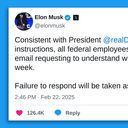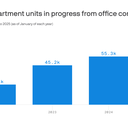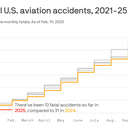Americans with disabilities warn protections are vanishing in Trump's DEI rollback
People with disabilities say President Trump's DEI purge is eroding health care, education and legal protections they've only won in recent decades.
Why it matters: The Trump administration has taken actions that undermine accessibility measures — critical for leveling the playing field for people with disabilities — as part of its efforts targeting diversity, equity, and inclusion efforts.
- "It's very clear that there is an orchestrated attack by conservatives to dismantle the rights of people with disabilities," said Shawn Murinko, a Washington resident who has cerebral palsy.
State of play: Trump last month ordered an end to all federal programs that mandate or invoke accessibility, alongside diversity, equity and inclusion.
- The Department of Justice said it will penalize programs that promote accessibility.
- Trump has pledged to close the Department of Education, which enforces protections for students with disabilities in school.
- Meanwhile, Food and Drug Administration officials said the word "disabled" was banned from external communications, though the White House later claimed that was an error.
- Cuts to National Institutes of Health funding also threaten existing and future disability research.
- The federal government is one of the largest employers for people with disabilities, but return-to-office mandates could force some out of their jobs.
Reality check: "Disability is a natural part of the human experience," said Katy Neas, chief executive officer of The Arc, which serves people with intellectual and developmental disabilities.
- "All people will probably face disability at some point in their life, whether it's due to illness, injury or age, and disability affects every family, regardless of race, ethnicity, sex, income or political party."
Republicans have floated cutting Medicaid, which provides health care for more than 10 million children and adults with disabilities — nearly 15% of the program's beneficiaries.
- Medicaid covers services that allow people with disabilities to live and work in their own communities rather in institutions or medical facilities. But waiting lists for those services are long.
- Medicaid-provided home and community services have been vital to Sean Pevsner, a Texas-based civil rights attorney with cerebral palsy. Their support has allowed him to attend college and law school, practice law, and lobby for disability rights, he said.
Threat level: A Republican-led lawsuit challenging a Biden-era policy to treat gender dysphoria as a protected disability has the potential to undermine a 1973 civil rights law that prohibits discrimination based on disability, advocates warn.
- Republican attorneys general leading the lawsuit told the court they don't want the entire section of the law overturned, only the provisions on transgender care.
- However, advocates remain concerned and say LGBTQ support programs frequently overlap with the disabilities community.
- According to the Human Rights Campaign, 1 in 3 LGBTQ adults report having a disability — including more than half of transgender adults.
- "Not only is disability on the chopping block," said Lizzy Graham, an autistic transgender woman with ADHD. "We have the entire LGBTQ community on the chopping block."
Beyond policies, advocates say Trump and those in his orbit routinely denigrate people with disabilities, giving supporters license to use the same rhetoric online.
- For example Trump incorrectly blamed DEI hires and people with intellectual and developmental disabilities at the Federal Aviation Administration for a fatal plane crash outside of Washington, D.C.
- Elon Musk, who heads Trump's Department of Government Efficiency, also regularly uses ableist slurs in his social media posts.
- This tone is "very hurtful, because people with disabilities have a right to work, and they get their jobs because they're qualified," said Sydney Badeau, a neurodivergent self-advocate in Wisconsin.
The other side: The Trump administration takes issue with lowering standards to achieve diversity, equity, inclusion and accessibility goals — not DEIA itself, the White House told Axios.
- "President Trump is a leader for all Americans. The Trump-Vance administration values the contributions of government employees with disabilities and believes they should be recognized and rewarded based on the merit of the work," a White House official said in an email.
Yes, but: Trump administration officials such as Health and Human Services Secretary Robert F. Kennedy Jr. have stigmatized disabilities by falsely linking vaccines to conditions such as autism, advocates say.
- That medicalizes disabilities, treating them as impairments that need to be fixed, Graham said. She prefers a "social model" that emphasizes societal barriers that create challenges for people with disabilities.
- Eroding support for disabled people "harkens back to the time when people with disabilities were put behind closed doors and not talked about instead of being celebrated and supported," said Nicole Jorwic, advocacy chief at Caring Across Generations, a coalition of caregivers and care recipients.
What's next: Ray Hemachandra, whose son Nicholas is autistic and medically fragile, said he wants more Republican families to join and be welcomed into disability advocacy circles.
- "I'm hopeful that we recognize, and that politicians recognize and legislators recognize, that Republicans are as likely to have a family member with intellectual and developmental disabilities as Democrats do," Hemachandran said.
Go deeper:
- Trump's DEI orders may halt progress for disabled workers
- Mapped: Medicaid recipients across the U.S.





















